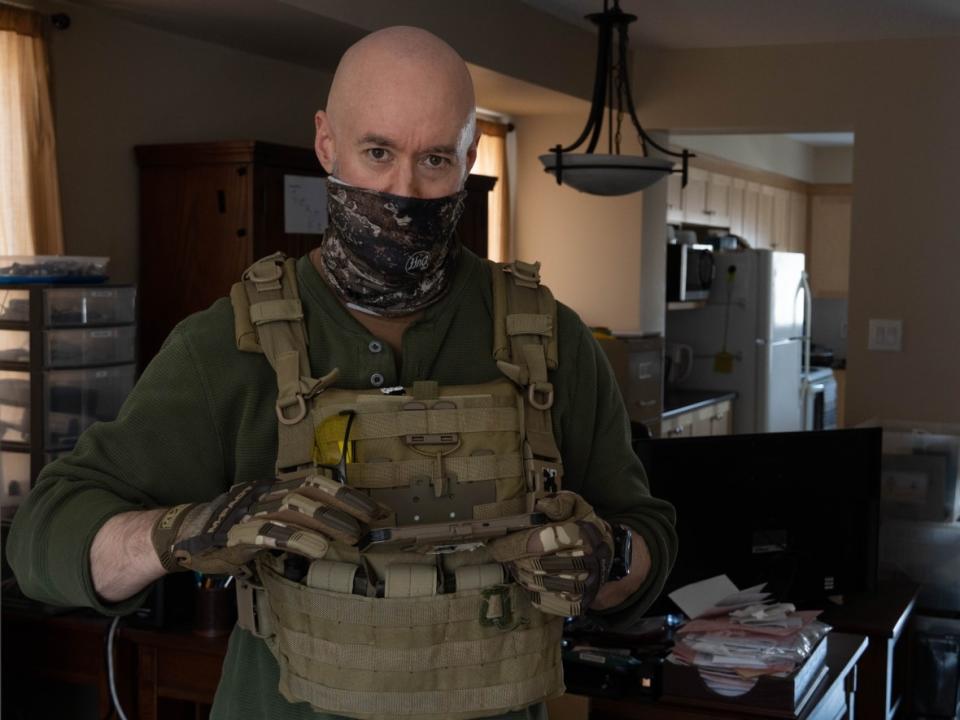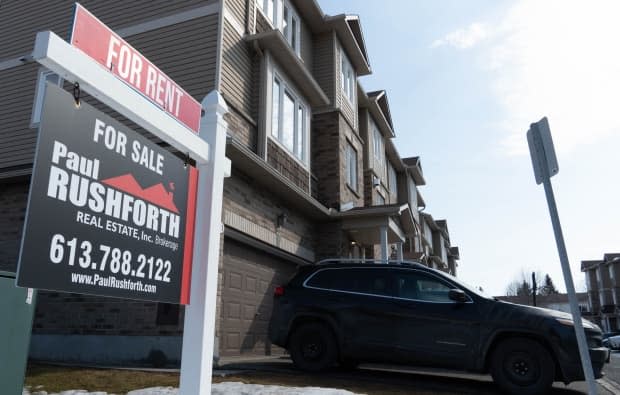'Can't sit back and watch': Former Canadian soldier joins fight in Ukraine

Boxes filled with JT's personal belongings littered the floor of his home in the west Ottawa suburb of Kanata as he readied to leave in mid-March.
Outside, a "For Rent" sign stands tall with the retired soldier telling his roommate to find a new place, unsure when, or if, the two will meet again.
The 50-year-old Ottawa resident — whom CBC News has agreed to not name due to safety concerns — is now in Ukraine as Russian forces continue their invasion of the sovereign nation.
"I can't sit back and watch it anymore. I have to do something," he said during an interview before he left.
Packed bags, including a load-bearing vest, his rucksack and gear he hopes to hand over to those who need it sit in the middle of the floor, ready to go.

JT said he joined the Canadian Armed Forces in 1994 and was deployed to Bosnia, Macedonia, Afghanistan and beyond. He said his experience lies in infantry and combat engineering operations, with a specialty as a combat diver.
He also has basic training in the disposal of explosives.
Ukrainian president Volodymyr Zelensky's pleas to governments and people around the world, as well as images of cities shelled, have stuck with the retired soldier, who has met up with Ukraine's International Legion to take up arms.
WATCH | Outrage mounts as Ukraine accuses retreating Russians of civilian massacre:
He also said he thinks about children now facing the horrors of war and other Ukrainians forced to take up arms.
"It is absolutely heartbreaking. It's very tough for me to see," he said. "Artists and musicians and so on that are suddenly having to step up and do things that are normally repugnant to the average person."
JT hopes to shoulder some of that burden, fearing what the war could mean for others including younger soldiers who will deal with the trauma for years to come.
His military experience may best be utilized in a training capacity, but JT said he will go where needed including more of a humanitarian capacity.
"If I go into combat, then I'm fairly certain my weapons skills will come back pretty quickly," he said before his flight, which he paid out of his own pocket.
Going to Ukraine 'sole responsibility' of traveller
Global Affairs Canada discourages any travel to Ukraine, issuing a travel advisory on Feb. 1. The federal department said its ability to provide consular services is severely limited, having no physical presence in Ukraine.
"The Government of Canada may not be able to provide any assistance to Canadian citizens who join militias or armies and are injured or captured by Russian forces," an emailed statement reads.
The department also doesn't maintain a record of Canadians who choose to travel to Ukraine, adding it's particularly dangerous to join as a foreign fighter.

"The decision to travel is the sole responsibility of the traveller and we cannot guarantee the safety and security of Canadians abroad."
National security expert Christian Leuprecht, a professor at the Royal Military College of Canada and Queen's University, cautions against Canadians making the trip.
He said conflicts like these often attract people with good but naive intentions, including people without proper training.
"You might get tortured by the Russians. You might get thrown in some Russian gulag and Siberia if they find you," he said.
"You might [develop] mental health sort-of issues. I mean, there's a whole host of consequences that might ultimately stem from this."
He believes the federal government needs to be careful about its messaging around Canadians who go and fight.
Still, Leuprecht says those with concrete skills to offer, whether in medicine, engineering, computer programming or, in this case, experience in the Canadian Armed Forces, may be an asset.

While he's only one person, JT said "every drop fills a bucket … and ultimately, this is a fire that we need to put out."
With his life in boxes and no guarantees how long his leave of absence from work can last, he doesn't rule out staying in eastern Europe and, hopefully, helping rebuild what has been so mercilessly destroyed.
For now, he's focused on what awaits him, but acknowledges the possibility it's a one-way trip.
"I've made my peace with everything, all my choices, with my friends and my co-workers, and I'm prepared for whatever comes," he said.
"But I guarantee that I'll be pushing as hard as I can to the end if that is what happens."

 Yahoo Sports
Yahoo Sports 